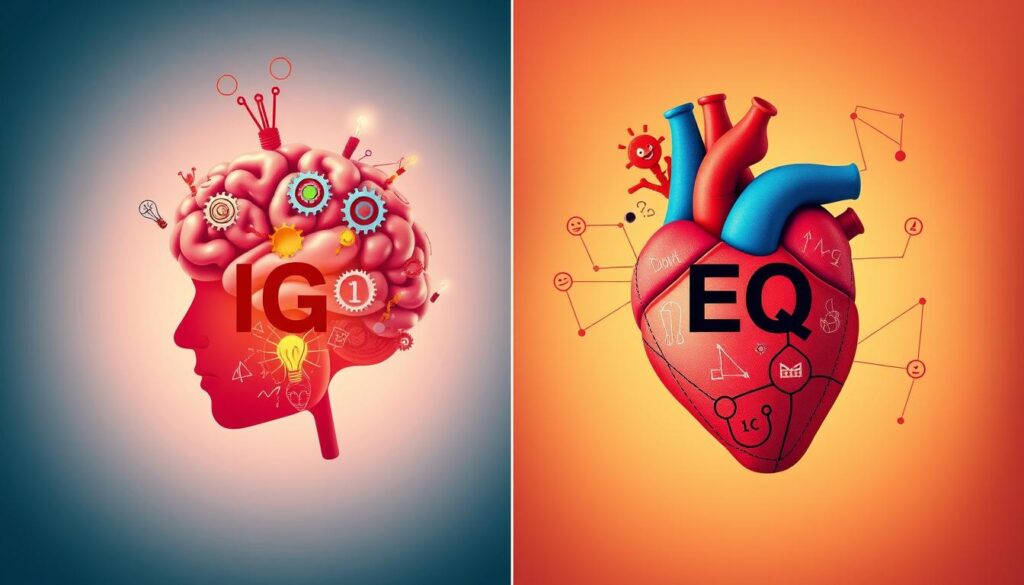What Is Emotional Intelligence: A Complete Guide
What is emotional intelligence ?
Imagine a world where we excel in both technical skills and understanding human emotions. This world is the realm of emotional intelligence (EQ). It’s a powerful set of abilities that can unlock new levels of success in our personal and professional lives.
Your emotional intelligence is key to building strong relationships and thriving under pressure. It’s the invisible thread that connects your thoughts, feelings, and actions. It guides you towards a more fulfilling life.
Key Takeaways
- Emotional intelligence is the ability to understand, use, and manage emotions effectively.
- EQ plays a crucial role in various aspects of life, including personal relationships, career success, and overall well-being.
- The concept of emotional intelligence gained prominence in the 1990s and has since become an essential factor in understanding human behavior and performance.
- Emotional intelligence involves recognizing and interpreting emotions in oneself and others, using emotions to facilitate thinking, and regulating emotions to promote personal growth and social relationships.
- Developing your emotional intelligence can lead to improved stress management, better decision-making, and stronger interpersonal skills.
Understanding the Fundamentals of Emotional Intelligence
Emotional intelligence (EQ) is key to human growth and how we connect with others. It includes knowing yourself, controlling your feelings, being motivated, feeling empathy, and having good social skills. EQ studies have grown from simple ideas to detailed models, giving us a deeper look at this complex topic.
Definition and Core Concepts
EQ is about knowing and handling your emotions and those of others. It helps you understand and manage your feelings and those around you. This skill is vital for success in both personal and professional life, helping you interact better, make smarter choices, and build stronger bonds.
The Evolution of EQ Studies
Psychologists Salovey and Mayer first talked about EQ in the 1990s. Their “Ability Model” looked at EQ as a skill to recognize, use, understand, and manage emotions. Later, Daniel Goleman came up with the “Mixed Model,” blending personal and social skills. K.V. Petrides introduced the “Trait Model,” focusing on how personality traits affect EQ.
The Science Behind Emotional Intelligence
EQ research comes from psychology, neuroscience, and studying social behavior. It shows that emotions are crucial for making decisions, solving problems, and thinking clearly. By mastering emotions, people can improve their well-being, relationships, and success in many areas of life.
| EQ Model | Key Aspects | Proponent |
|---|---|---|
| Ability Model | Focuses on the cognitive aspects of emotional intelligence, such as the ability to identify, use, understand, and manage emotions. | Salovey and Mayer |
| Mixed Model | Integrates personal competencies (self-awareness, self-regulation, motivation) and social competencies (empathy, social skills). | Daniel Goleman |
| Trait Model | Emphasizes the role of personality traits in emotional intelligence, such as adaptability, empathy, and emotional expression. | K.V. Petrides |
“Emotional intelligence is the ability to sense, understand, and effectively apply the power and acumen of emotions as a source of human energy, information, connection, and influence.” – Robert K. Cooper
What Is Emotional Intelligence and Why It Matters
Emotional intelligence, or EQ, is key to many areas of life. It affects personal relationships, career success, and mental health. Studies show EQ’s big impact on our well-being and performance.
Research shows EQ links to better mental and physical health. It also leads to positive mood, higher self-esteem, and more satisfaction with social support. EQ helps protect against health issues and builds resilience.
Today, employers value EQ skills more than ever. They look for self-awareness, self-regulation, and empathy. Surveys show EQ is now more important than IQ in some cases.
EQ is crucial for leaders. Emotionally intelligent leaders inspire and motivate their teams. They handle stress and navigate complex roles better. Professions like social workers and criminal justice professionals need high EQ.
Understanding EQ helps improve decision-making and communication. It boosts resilience against life’s challenges. EQ is essential for both personal and professional success.
“Emotional intelligence is a set of skills that involve identifying and understanding emotions in ourselves and others, and using that information to guide our thinking and behavior.”
– Peter Salovey and John Mayer, pioneers in the field of emotional intelligence research
The Key Components of Emotional Intelligence
Emotional intelligence, or EQ, is a vital skill set. It includes self-awareness, self-regulation, motivation, empathy, and social skills. These components help us deal with life’s complexities. By improving these EQ skills, we open doors to personal growth, better relationships, and success.
Self-Awareness and Personal Growth
At the core of EQ is self-awareness. It’s knowing your emotions, strengths, and weaknesses. This knowledge helps you manage your feelings, make smart choices, and set goals. Growing in self-awareness leads to personal fulfillment and strength.
Self-Regulation and Emotional Control
Emotional control is key in EQ. Self-regulation lets you handle tough situations calmly. It helps you control impulses and adjust your actions. This skill reduces stress, improves decisions, and strengthens relationships.
Motivation and Goal Achievement
People with high EQ are driven to reach their goals. Motivation is the third essential EQ component. It helps you keep going, overcome hurdles, and stay focused on your dreams. By using your motivation, you can reach your full potential.
Empathy and Understanding Others
Empathy is a core EQ trait. It lets you feel and share others’ feelings. This skill helps you communicate better, build strong bonds, and create a more harmonious world. Empathy brings compassion, teamwork, and a deeper connection with others.
Social Skills and Relationship Building
The last EQ component is social skills. They help you handle social situations, communicate well, and build lasting connections. Good social skills help you solve conflicts, work in teams, and create supportive relationships.
By focusing on these five EQ components, you open up many opportunities. You’ll make better decisions, manage stress, and improve communication. Growing your EQ is a journey, but the benefits are endless.
EQ vs. IQ: Understanding the Crucial Differences
Emotional intelligence (EQ) and cognitive intelligence (IQ) are two different parts of human smarts. IQ deals with solving problems and logical thinking. EQ, on the other hand, is about knowing your emotions, getting along with others, and being flexible.
Studies show EQ is more key for top leaders than IQ. This is a big difference from IQ, which usually stays the same as you grow older. But EQ can grow with practice and effort.
People with high EQ tend to be healthier, have stronger bonds, and do better in their careers. EQ includes knowing yourself, controlling your feelings, staying motivated, feeling for others, and being good at working with people. These skills are vital for dealing with life’s challenges.
Also, EQ can help companies meet goals in the Baldrige Excellence Framework®. This framework helps many businesses and non-profits succeed and stay competitive.
“Ninety percent of the success of outstanding leaders is attributable to EQ, which is twice as important as IQ.”
IQ and EQ are both important, but EQ has a big effect on success. By knowing the difference, you can work on your emotional skills. This can lead to personal and professional growth.

The Impact of Emotional Intelligence in the Workplace
In today’s fast-paced business world, emotional intelligence (EQ) is key. It helps us understand, manage, and reason with emotions. This skill is crucial for success in leadership, team work, and career growth.
Leadership and Team Management
Leaders with high EQ know how to motivate their teams. They use self-awareness and empathy to build trust and teamwork. This leads to better productivity and job happiness.
These leaders are great at handling tough team issues. They inspire their teams, making everyone feel valued and motivated.
Communication and Conflict Resolution
People with high EQ communicate well and solve conflicts. These skills are essential in the workplace, where different views and disagreements happen. They listen actively, show empathy, and find solutions that work for everyone.
This makes the workplace more united and peaceful.
Career Advancement Opportunities
Those with strong EQ often get ahead in their careers. Employers see EQ as a sign of adaptability, resilience, and teamwork skills. By improving their EQ, people can open up new career paths and opportunities.
In summary, emotional intelligence is vital in the workplace. It shapes leadership, improves teamwork, and helps in communication and conflict resolution. It’s a skill that can take individuals and organizations to great heights.
| Key Insight | Statistic |
|---|---|
| Emotional intelligence as a top skill needed in business | The World Economic Forum’s “Future of Jobs Survey 2020” projected that emotional intelligence will be one of the top skills needed in business in 2025. |
| Emotional intelligence vs. rational intelligence (IQ) | Emotional intelligence, quantified by EQ (Emotional Quotient), is theorized to be more important in business than rational intelligence, quantified by IQ. |
| Emotional intelligence in hiring and professional development | Employers are increasingly considering emotional intelligence as a crucial indicator of prospective employees’ capabilities for functioning well in the company’s culture. |
| Emotional intelligence and workplace performance | Emotional intelligence is correlated with traits like perseverance, self-control, and performance under pressure in the global economy. |
“Emotional intelligence is a powerful tool for leaders to build strong teams, navigate complex challenges, and drive organizational success.”
Benefits of High Emotional Intelligence
Having high emotional intelligence (EQ) brings many benefits to your life. Studies show that people with strong EQ skills have better mental health, less stress, and better physical health. They also have more fulfilling personal relationships and succeed more in their careers.
One big plus of high EQ is better leadership skills. Those who manage their emotions well make better decisions, are more empathetic, and communicate better. This helps them lead and inspire others, creating a positive work environment.
High EQ also means you’re more resilient when facing challenges. You can handle tough situations, recover from setbacks, and stay happy and satisfied with life.
| Advantages of Emotional Intelligence | EQ Benefits |
|---|---|
| Improved mental health | Reduced stress levels |
| Better physical health | More satisfying personal relationships |
| Enhanced leadership skills | Increased career success |
| Improved decision-making | Greater resilience and well-being |
Emotional intelligence offers many benefits for personal and professional growth. By improving your EQ, you gain self-awareness, emotional control, and better relationships. This leads to a more fulfilling and successful life.

Common Signs of High and Low Emotional Intelligence
Emotional intelligence, or EQ, is key to success and happiness. People with high EQ know themselves well, manage their feelings, and care about others. On the other hand, those with low EQ show signs that need attention.
Indicators of High EQ
- Ability to accurately identify and manage one’s own emotions
- Empathy and understanding of others’ feelings and perspectives
- Effective communication and conflict resolution skills
- Capacity to build and maintain healthy relationships
- Resilience in the face of challenges and setbacks
Red Flags of Low EQ
Those with low EQ find it hard to control their feelings, don’t get others, and struggle in relationships. Some common signs include:
- Difficulty recognizing and managing their own emotions
- Inability to understand and respond appropriately to others’ feelings
- Poor communication skills and frequent conflicts with others
- Tendency to blame others instead of taking personal responsibility
- Avoidance of emotionally charged situations or hiding their true emotions
Assessment Methods
There are many ways to check emotional intelligence, like questionnaires, tests, and feedback from others. These tools help people see their emotional strengths and where they can get better. This is the first step to improving emotional intelligence.
“Emotional intelligence is the ability to recognize, understand, manage, and reason with emotions. It’s a crucial skill for personal and professional success.”
Practical Steps to Improve Your Emotional Intelligence
Improving your emotional intelligence (EQ) is a lifelong journey. There are practical steps you can take to develop this valuable skill. Here are some effective techniques to help you improve your emotional intelligence and unlock its many benefits.
- Foster Self-Awareness: Spend time in self-reflection, exploring your emotions, thoughts, and behaviors. Practice mindfulness to gain deeper insights into your inner world and identify areas for growth.
- Regulate Your Emotions: Develop strategies to manage your feelings effectively, such as deep breathing, cognitive restructuring, and positive self-talk. Learning to control your impulses and respond constructively can significantly enhance your EQ.
- Cultivate Empathy: Make a conscious effort to understand others’ perspectives and emotions. Active listening, asking thoughtful questions, and striving to see the world through different lenses can help you become more empathetic.
- Seek Feedback: Regularly ask for feedback from trusted friends, family, or colleagues to gain valuable insights into your strengths and areas for improvement. This can help you identify blind spots and develop a more accurate self-assessment.
- Practice Social Skills: Engage in activities that challenge your communication and interpersonal abilities, such as conflict resolution, public speaking, or collaborative projects. Honing your social skills can contribute to developing emotional intelligence.
Remember, improving your EQ improvement techniques is an ongoing process. Consistently applying these strategies and maintaining a growth mindset will help you become more emotionally intelligent over time.
“Emotional intelligence is the ability to sense, understand, and effectively apply the power and acumen of emotions as a source of human energy, information, connection, and influence.”
– Robert K. Cooper
By prioritizing the development of your emotional intelligence, you’ll not only enhance your personal and professional relationships but also unlock new opportunities for success and fulfillment.
Conclusion
Emotional intelligence is key for success in life and work. It helps you build better relationships and become a better leader. It also boosts your overall happiness.
By improving EQ skills like self-awareness and empathy, you can reach your full potential. Emotional intelligence is more important than IQ for leaders. It helps you adapt and bounce back from challenges.
The emotional intelligence summary shows EQ is essential for growth. It improves teamwork and helps you handle work’s complexities. Making EQ a priority is crucial for success in today’s world.
FAQ
What is emotional intelligence?
What are the key components of emotional intelligence?
How does emotional intelligence differ from IQ (Intelligence Quotient)?
Why is emotional intelligence important?
What are the benefits of high emotional intelligence?
How can I improve my emotional intelligence?
How can emotional intelligence be assessed?
Source Links
- Improving Emotional Intelligence (EQ): Expert Guide – https://www.helpguide.org/mental-health/wellbeing/emotional-intelligence-eq
- What Is Emotional Intelligence? A Comprehensive Guide – MindOwl – https://mindowl.org/emotional-intelligence/
- What Is Emotional Intelligence and Its Importance | Simplilearn – https://www.simplilearn.com/emotional-intelligence-what-why-and-how-article
- Emotional Intelligence (EQ): Components and Examples – https://www.simplypsychology.org/emotional-intelligence.html
- Emotional Intelligence in Leadership: Your Key to Success – https://nccusa.edu/blog/the-role-of-emotional-intelligence-in-leadership/
- What Is Emotional Intelligence and Why Does It Matter? – https://www.psychologytoday.com/us/blog/the-complexities-of-life/202405/what-is-emotional-intelligence-and-why-does-it-matter
- EQ: What is it and Why Does it Matter? – https://www.snhu.edu/about-us/newsroom/career/emotional-intelligence
- 5 Key Components of Emotional Intelligence – https://www.verywellmind.com/components-of-emotional-intelligence-2795438
- What Are The 5 Components Of Emotional Intelligence? – https://elearningindustry.com/what-are-the-components-of-emotional-intelligence
- Which Is More Important for Leaders: EQ or IQ? – https://www.nist.gov/blogs/blogrige/which-more-important-leaders-eq-or-iq
- Emotional Intelligence: Your EQ vs. IQ – https://www.linkedin.com/pulse/emotional-intelligence-your-eq-vs-iq-jess-stainbrook-maci-hdzhc
- The Importance of Emotional Intelligence in the Workplace – https://appliedpsychologydegree.usc.edu/blog/emotional-intelligence-in-the-workplace
- The 10 Benefits of Emotional Intelligence in the Workplace – ManageMagazine – https://www.managemagazine.com/article-bank/emotions-emotional-intelligence/the-10-benefits-of-emotional-intelligence-in-the-workplace/
- 15 Powerful Benefits of Emotional Intelligence Training – Continu – https://www.continu.com/blog/15-benefits-of-emotional-intelligence-training
- Unlocking the benefits of emotional intelligence – https://www.avma.org/news/unlocking-benefits-emotional-intelligence
- Signs of Low Emotional Intelligence – https://www.verywellmind.com/signs-of-low-emotional-intelligence-2795958
- What Is Emotional Intelligence? – https://www.webmd.com/mental-health/what-is-emotional-intelligence
- How to Improve Emotional Intelligence – https://www.betterup.com/blog/how-to-improve-emotional-intelligence
- How to Improve Your Emotional Intelligence: A Science-Backed Guide – Custom gratitude journals for mental wellness – https://www.pockitudes.com/blog/-how-to-improve-your-emotional-intelligence-a-science-backed-guide?srsltid=AfmBOoqCxoM_ZIV_CGismUaMYQfiT4I8spp0K_6CDdWAgACvGT3NMY9F
- Training Emotional Intelligence: 10 Practical Tips & Exercises – https://masterplan.com/en-blog/training-emotional-intelligence
- The Crucial Role of Emotional Intelligence and Empathy in Modern Leadership – https://voltagecontrol.com/blog/the-crucial-role-of-emotional-intelligence-and-empathy-in-modern-leadership/
- Why EQ Matters More Than IQ in the Workplace – https://www.engageemployee.com/blog/why-eq-matters-more-than-iq-in-the-workplace
- Cultivating Emotional Intelligence in Your Workplace | AmplifAI – https://www.amplifai.com/blog/emotional-intelligence-in-your-workplace

